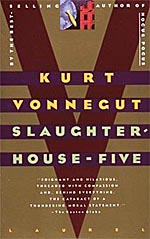
![]() Rhondak101
Rhondak101
1/17/2012
![]()
I read Kurt Vonnegut's Cat's Cradle for a class in college many years ago. I didn't like it, so I've been avoiding Vonnegut since then. However, Slaughterhouse-Five keeps appearing on all sorts of "Best Of" lists, so I decided that I'd give it a try. After all, it is supposed to be the great anti-war novel. I don't think that the novel holds up well. Its depiction of war seems tame now in the years after Tim O'Brien's The Things They Carried. Its profanity and depictions of sex seem unremarkable these days. It doesn't seem very controversial anymore, and I really wonder why schools keep banning it. However, I must admit that I read this just after finishing Alan Moore and Eddie Campbell's From Hell. (Many books could seem tame on the violence and profanity scales after From Hell.)
My major disappointment was the small role that the fire-bombing of Dresden played. I expected this to be the central event of the novel, but it occurs near the end and is not described in much detail. As a kind of anti-novel, there is not a main focus as the protagonist Billy Pilgrim has become "unstuck in time" and slips from one event of his life to another in non-linear manner. The major events the readers see are Billy's capture in WWII and his experiences as a POW, his life as an optometrist in 1950s and 60s New York; his survival of a plane crash and subsequent recovery; his life before becoming a soldier; his capture by aliens from Tralfamadore and his life on that planet.
What is interesting about the novel is its meta-fictional style. The author, Vonnegut, and the author who appears in Chapter One discussing his intention to write a novel about the fire-bombing of Dresden seem to sometimes be the same person and at other times different. We are unsure if the authorial-I creates Billy Pilgrim or knew Billy Pilgrim in the war. This authorial-I does insert himself into the narrative. At one point, the author inserts. "That was I. That was me. The author of this novel." It is unclear, however, if the author believes Billy's beliefs about time-slipping and traveling to the planet Tralfamadore. Is Billy's story reliable within the world of the authorial-I? We just don't know.
The science-fiction element of time-slippage seems to be a gimmick that Vonnegut used to enable him to structure the novel in a non-linear way. The other science-fiction element, the aliens of Tralfamadore, allowed Vonnegut to claim that all time occurs simultaneously, not linearly. Vonnegut is not really interested in creating a believable alien culture. These aliens, like the time slippage, just seem gimmicky to me.
I'm glad I read the book, but I expected more anti-war rhetoric and bolder depictions of atrocity. I realize that I can't appreciate the book for the impact that would have had in 1969. I just read Emil's fabulous review (to the left on this WWE page). I wish that the book had struck me as poignantly as it did him. I see in his review how he relates Vonnegut's book to the personal toll of war--"the efforts of rebuilding a life and recapturing humanity." In a way, Vonnegut is doing exactly what O'Brien says about writing in his "If I Die In a Combat Zone...": "Can the foot soldier teach anything important about war, merely from having been there? I think not. He can tell war stories."